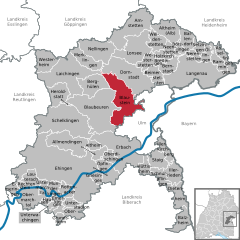
Back Blaustein ALS Блауштайн CE Blaustein (munisipyo) CEB Blaustein German Blaustein Esperanto Blaustein Spanish Blaustein Basque بلاوشتاین Persian Blaustein French Blaustein Hungarian
You can help expand this article with text translated from the corresponding article in German. (February 2009) Click [show] for important translation instructions.
|
Blaustein | |
|---|---|
 Town hall in Arnegg | |
Location of Blaustein within Alb-Donau-Kreis district  | |
| Coordinates: 48°25′6″N 9°54′29″E / 48.41833°N 9.90806°E | |
| Country | Germany |
| State | Baden-Württemberg |
| Admin. region | Tübingen |
| District | Alb-Donau-Kreis |
| Government | |
| • Mayor (2023–31) | Konrad Peter Menz[1] (CDU) |
| Area | |
| • Total | 55.61 km2 (21.47 sq mi) |
| Elevation | 495 m (1,624 ft) |
| Population (2022-12-31)[2] | |
| • Total | 16,667 |
| • Density | 300/km2 (780/sq mi) |
| Time zone | UTC+01:00 (CET) |
| • Summer (DST) | UTC+02:00 (CEST) |
| Postal codes | 89134 |
| Dialling codes | 07304, 0731 |
| Vehicle registration | UL |
| Website | www.blaustein.de |
Blaustein (German pronunciation: [ˈblaʊ̯ʃtaɪn]) is a town in the district of Alb-Donau Baden-Württemberg in Germany. It is situated on the Blau River, 6 km west of Ulm and has about 15,000 inhabitants.
Before 1968, Blaustein was known as Herrlingen. It was created in 1968 after the union of Ehrenstein and Klingenstein. During the 1970s, the municipalities of Arnegg, Bermaringen, Dietingen, Herrlingen, Lautern, Markbronn, Weidach and Wippingen became part of the new municipality of Blaustein. Herrlingen was the home of Anna Essinger's boarding school, Landschulheim Herrlingen, founded in 1926. In 1933, with the rise of Nazism, Essinger moved the school and, with their parents' permission, the school's 66 Jewish pupils to safety in England.[citation needed]
- ^ Bürgermeisterwahl Blaustein 2023, Staatsanzeiger. Retrieved 13 June 2024.
- ^ "Bevölkerung nach Nationalität und Geschlecht am 31. Dezember 2022" [Population by nationality and sex as of December 31, 2022] (CSV) (in German). Statistisches Landesamt Baden-Württemberg. June 2023.


